The forum highlighted the centrality of science, technology and innovation for agrifood systems transformation.
This event presented the problems faced by the marginal agricultural areas and highlight the role of science, technology and innovation in enhancing the resilience of marginal agricultural areas.
Extracts of the programme
18/10 Science, Technology and Innovation (STI) for improving agricultural productivity and competitiveness in Africa
Organized by FAO Regional Office for Africa (FAO RAF)See the recording
FAO-WUR new priorities aligned with the 2021 Memorandum of Understanding
Opening statements
Ceremony of signature of the renewed MOU between FAO and FRI
18/10 16:00 – 17:45 Harnessing science and innovation for sustainable livestock transformation
Investments in agricultural research remains extremely low, especially in low- and lower-middle-income countries. For every 100 dollars of agricultural GDP, only between 34 and 72 cents are being spent on agricultural research and development. The investment is uneven, as very few high-income countries were responsible for almost 60 percent while low-income countries’ was just 2 percent of the global total. This special event provided a global overview of the current situation regarding investments in agricultural research for development and future demand and prospects.
The session highlighted the challenges and opportunities on how good interaction and excellent working relationships are crucial to successfully influencing or initiating change with participation of policymakers, scientists and society.
This event showcased the transformative potential of specific science-based interventions, innovations and investment approaches that can support countries to implement their national Agrifood Systems pathways within their overall efforts to achieve the SDGs. The event featured the launch of the Scientific Advisory Group of the UN Food Systems Coordination Hub and will introduce the Youth and Indigenous People focal points for the Hub.
FAO’s first-ever Science and Innovation Strategy (the Strategy) was designed through an inclusive, transparent and consultative process as a key tool to support the delivery of the Strategic Framework 2022-31 and hence the 2030 Agenda for Sustainable Development. The discussion focused on next steps in strengthening science and evidence decision-making and supporting innovation and technology at country level.
This event highlighted the reasons for low agricultural productivity and present the potential of science, technology and innovation to increase the agricultural productivity improve the situation.
AGENDA | Webcast | UN WebTV
This event discussed, from national and regional perspectives, the potential benefits, food safety related issues, and unintended consequences of gene-editing technologies, as well as the barriers to adoption and diffusion, implications for small-scale producers, and ethical, regulatory and policy issues in the context of agrifood systems.
This special event elicited regional perspectives on how science and innovation can drive Africa’s transformation to more efficient, inclusive, resilient and sustainable agrifood systems. Speakers included professionals from research institutions, development agencies, academia, policy think tanks, private sector and civil society.
- Ousmane Badiane. Executive Chairperson Acting Managing Director Academiya 2063
- Sithembile Ndema Mwamakamba Director of Policy Research and AnalysisFANRPAN
- Aggrey Agumya Director for Research and Innovation FARA
In December 2021, a renewed Memorandum of Understanding (MoU) was signed by the FAO Director-General and the President of the Wageningen University and Research Executive Board to further strengthen and accelerate their cooperation.
- Sjoukje Heimovaara President of the Wageningen University and Research Executive Board
- H.E. Ambassador Marcel Beukeboom The Permanent Representative of the Kingdom of the Netherlands to the UN Organizations for Food and Agriculture
- Ismahane Elouafi Chief Scientist, FAO
Technical Panel discussion
- Wim van der Poel WUR Expert Research Leader 'Emerging and Zoonotic Viruses'
- Hung Nguyen ILRI Expert Co-Leader, Animal and Human Health Program, International Livestock Research Institute
- Barbara Haesler FAO Expert Knowledge and Evidence Lead for One Health, FAO
18/10 16:00 – 17:45 Partnership for co-developing research and innovation: sharing experiences from FAO and Cirad, INRAE & IRD
FAO and French Research Institutes (FRI) have a strong and long-standing commitment to cooperate for co-developing knowledge, expertise, capacities and innovations in a large range of thematic areas from rural development, land use, production, nutrition, livestock, water, soil, as also agroecology, biodiversity and digital technologies. This special event celebrates the renewal of the Memorandum of Understanding (MoU) between FAO and the three major French research institutes for rural and agricultural development, and environment: the
International Center for Agricultural Research for Development (CIRAD), the National Research Institute for Agriculture, Food and the Environment (INRAE) and the Research Institute for Development (IRD).
International Center for Agricultural Research for Development (CIRAD), the National Research Institute for Agriculture, Food and the Environment (INRAE) and the Research Institute for Development (IRD).
Opening statements
- Laurent Thomas DDG, FAO
- Valérie Verdier President-CEO of IRD
- Philippe Mauguin President-CEO of INRAE
- Elisabeth Claverie de Saint-Martin President-CEO of CIRAD
FAO and FRI joint work and foreseen collaboration towards impacts
- Moderator: Raoul Mille Science Advisor at the Permanent mission of France to the United Nations in Rome
- Benjamin Roche Research Director, IRD
- Zelalem Tadesse Senior Animal Health Officer, CJWZ, FAO
- Pascal Bonnet Deputy Director of DigitAg, CIRAD
- Nevena Alexandrova Senior Extension Officer, OIN, FAO
- Jean-François Soussana Vice President for International Relations, INRAE
- Anne Mottet Livestock Development Officer, NSAG, FAO
- Beth Bechdol Deputy Director-General FAO
- Ismahane Elouafi Chief Scientist, FAO
"It's important to reconcile agroecology with the science of gene editing" - Elisabeth Claverie de Saint-Martin President-CEO of CIRAD
- Philippe Mauguin President-CEO of INRAE
- Valérie Verdier President-CEO of IRD
- Moderator: Fatouma Seid Deputy Director of PSU, FAO
18/10 16:00 – 17:45 Harnessing science and innovation for sustainable livestock transformation
The session showcased tools and initiatives contributing to transforming the livestock sector to a more environmentally, economically and socially sustainable sector. Innovative tools and initiatives will be presented across three thematic areas: (i) sustainable livestock systems for food security, nutrition and inclusive economic growth; (ii) animal, public and environmental health through the One Health approach; and (iii) natural resource use, climate change and biodiversity.
See the recording
19/10 11:00 – 12:45 Investments in agricultural research for development: Are we on the right track?
- Magdalena Skipper, Editor in Chief, Nature Food
- Kanayo Felix Nwanze, Chairman and Chief Executive, FAYODE
- Dr Robert Bertram, Chief Scientist, USAID
- Gert-Jan Stads, Senior Program Manager International Food Policy Research Institute (IFPRI), USA
- Keith Fuglie, Senior Economist, Economic Research Service, U.S. Department of Agriculture, USA
- Philip Pardey, Director, International Science and Technology Practice and Policy Center, University of Minnesota, USA
- Martin Kropff, CGIAR Global Director of the Resilient Agri-food Systems Science Area (RAFS) CGIAR System Management Office, France
- Diego Canga Fanon, Director for outreach, research and geographical indications, European Commission, Belgium
- Alice Karanja, ICRAF, Kenya
19/10 SM01 - Opening of the Science and Innovation Forum: Are we doing enough to achieve the SDGs?
Science and innovation are powerful components of evidence-based decision-making at all levels and key to transforming agrifood systems as affirmed by the 2021 UN Food Systems Summit (UNFSS). The opening session of the science and innovation forum with the Chief Scientists of the UN agencies will focus on how Science, Technology, and Innovation (STI) can contribute and provide innovative solutions to achieve the SDGs, with due consideration to social and ethical dimensions, leaving no one behind.See the recording
19/10 16:00 – 17:45 Science, Policy and Society Interface: Challenges and opportunities
- Bibi Ameenah Firdaus Gurib-Fakim Former president of Mauritius Keynote speech: Science–Policy–Society Interface: Opportunities and challenges
- Asia Mohamed Vice-Chair The Intergovernmental Science-Policy Platform on Biodiversity and Ecosystem Services (IPBES)
- Patrick Caron CGIAR System Board Member & Vice President for International Affairs at the University of Montpellier
- Abdalah Mokssit Secretary, Intergovernmental Panel on Climate Change (IPCC)
- Hilal Elver Formerly UN Special Rapporteur for the Right to Food & Member of the Steering Committee of the High-Level Panel of Experts (HLPE) at the World Committee of Food Security and Nutrition (CFS)
- Patrick Webb Professor at Tufts University
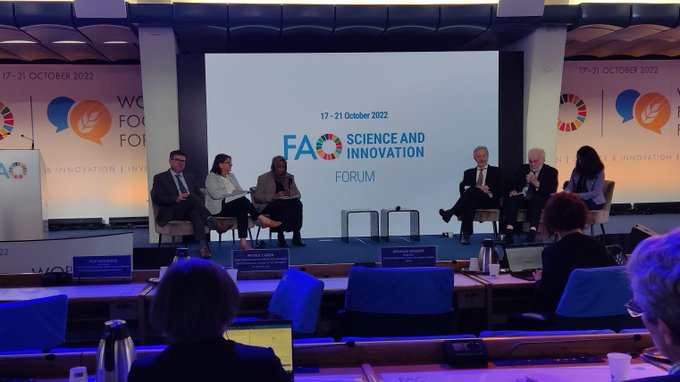
Opening and High Level UN Panel
- Stefanos Fotiou Director, Office of the SDGs and the UN Food Systems Coordination Hub
- Ms. Amina J. Mohammed UN Deputy Secretary-General
- Dr QU Dongyu FAO Director General
- Mr. Alvaro Lario President, IFAD
Investing in food systems transformations
- Moderator: Maximo Torero Chief Economist, FAO
- Moderator: Ismahane Elouafi Chief Scientist, FAO
- Joachim von Braun Director Center for Development Research (ZEF) University of Bonn Germany
- Liu Guodao Vice President Chinese Academy of Tropical Agricultural Sciences (CATAS) China
- Ruben Echeverria Senior Advisor - Agricultural Development, Bill & Melinda Gates Foundation USA
- Jennifer Clapp Research Chair in Global Food Security and Sustainability Faculty of Environment University of Waterloo Canada
20/10 09:00 – 10:45 Marrying technical progress and knowledge integration for better One Health outcomes in agrifood systems
Incl. EU research initiatives the European Commission has on the implementation of the One health approach in the agrifood systems - Kerstin Rosenow European Commission, DG AGRI, Head of Unit F2 Research and Innovation Brussels, Belgium
20/10 11:00 – 12:45 FAO Science and Innovation Strategy: What’s next?
- Ismahane Elouafi FAO Chief Scientist - Moderator
- Qu Dongyu Director-General, FAO - Opening Remarks
- Hans Hoogeveen Independent Chairperson of the FAO Council - Remarks on FAO Science and Innovation Strategy
- H.E. Asmahan Abdulhameed Altoqi Ambassador and Permanent Representative of the Republic of Yemen to FAO
- H.E. Morten von Hanno Aasland Ambassador and Permanent Representative of the Kingdom of Norway to the United Nations Rome-based agencies.
- H.E. M. García Winder Ambassador and Permanent Representative of Mexico to the United Nations Agencies based in Rome
“Science cannot be in a hurry” - H.E. Guang Defu Ambassador and Permanent Representative of the People’s Republic of China to the United Nations Agencies for Food and Agriculture
- H.E. Thesele John ‘Maseribane Ambassador and Permanent Representative of the Kingdom of Lesotho to FAO
- Rodney M. Hunter Deputy Permanent Representative of the United States of America to the UN Agencies in Rome
20/10 14:00 – 15:45 Increasing Agricultural Productivity in Africa: Can STI help Africa to make a quantum leap in agricultural productivity?
- H.E M. Papa Abdoulaye SECK Ambassador and the Permanent Representative of Senegal to FAO - Keynote speech: Increasing Agricultural Productivity in Africa: Can STI help Africa to make a quantum leap in agricultural productivity?
- H.E Yaya Olaitan Olaniran Ambassador and the Permanent Representative of Nigeria to FAO
- Dr Segenet Kelemu Director General, International Centre for Insect Physiology and Ecology Kenya
- Dr Ruben Echeverria, Senior Advisor - Agricultural Development, Bill & Melinda Gates Foundation USA
- Dr Redouane Choukr-Allah Senior Professor University Mohamed VI Polytechnic
- Benguerir, Morocco
- Ms Pacem Kotchofa Agricultural Economist International Water Management Institute (IWMI)
20/10 Agrifood Systems Technologies & Innovations Outlook (ATIO)
This event introduced the FAO Agrifood Systems Technologies and Innovations Outlook (ATIO) - a key enabler for achieving the vision outlined in FAO’s first-ever Science and Innovation Strategy. ATIO’s overall objective is to curate existing information on the current, measurable state of agrifood system science, technology and innovation (STI) and upcoming changes, as well as their transformative potential, to inform evidence-based policy dialogue and decisions, including on investments.20/10 16:00 – 17:45 STI Roadmaps: The role of digital technologies in agricultural production/consumption.
Organized by DESA, FAO, UN Tech Envoy Office, EC/JRC, and UNESCO AGENDA
This panel brought together key stakeholders in the field of digital technologies, agrifood systems, and STI4SDGs roadmaps. It supports the work in the lead up to the 8th Multi-stakeholder Forum on Science, Technology and Innovation for the SDGs (STI Forum), May 2023.
Panel I: Building innovation eco-system through roadmapping digital technologies in agriculture production/consumption
- Dr Sarah Tione, Principal Economist, Ministry of Agriculture, Department of Agriculture Planning Services, Policy Unit, Lilongwe, Government of Malawi
- Prof. WU Wenbin, Director General of the Institute of Agricultural Resources and Regional Planning (IARRP), Chinese Academy of Agricultural Sciences (CAAS), Beijing, China
- Dr Wilhelmina Quaye, Director of CSIR-Science and Technology Policy Research Institute, Accra, Ghana
- Dr Agnes Lutomiah, Head of Program, STI, Knowledge and Society, African Centre for Technology Studies (ATPS), Nairobi, Kenya
- Dr Viktor Nedović, Director of Serbia Accelerating Innovation and Entrepreneurship Project – SAIGE, Ministry of Education, Science and Technological Development, Belgrade, Serbia
- Mr. Randolf B. Hackman, Application Development Analyst (Accenture), Alumni, Engineering for Change (E4C), Nantes, France
Panel II: STI Frontiers, Opportunities and Challenges in the Transformation of Agrifood System
- Mr Alessandro Rainoldi, Head of Territorial Development Unit, Joint Research Centre, European Commission, Seville, Spain
- Prof Sachin Chaturvedi, Director-General, Research and Information System for Developing Countries (RIS), New Delhi, India
- Mr. Tian (Ben) Feng, Dean of Intelligent Industry Research Institute, SenseTime, Hong Kong
- Dr. Vittorio Venturi, Scientific Coordinator and Head of the Bacteriology Lab, International Centre for Genetic Engineering and Biotechnology (IGCEB), Trieste, Italy
- Mr. Parmesh Shah, Global Lead for Rural Livelihoods and Agricultural Jobs, Agriculture, the World Bank, Washington DC.
- Mr. Dioscore Shikama, Executive Chairman at Food Bundles, Kigali, Rwanda
21/10 Levelling the playing field: Eliminating inequalities in accessing science, technology and innovation across value chains
AGENDA | Webcast | UN WebTV
Smallholder farmers and Small and Medium Enterprises (SMEs), particularly those headed by women, face huge challenges in accessing appropriate scientific knowledge and technologies.
The session highlighted the barriers for accessing technologies, innovation and information services and present the ways and means to eliminate inequalities. The session will see the "launch of the Accelerator Mentorship Programme for Women-led Small and Medium Enterprises (SMEs) in Africa".- HE Gabriel Ferrero de Loma-Osorio UN Committee on World Food Security Chairperson &
Ambassador at Large for Global Food Security Spain - Opening Remarks - Emmanuel Charles Minister Counsellor, Ambassade de la République d'Haïti
- Amit Roy Vice-Chair Sasakawa Africa Association (SAA) Derwood, USA
- Nitya Rao Director, Norwich Institute for Sustainable Development School of International Development , University of East Anglia Norwich, UK
- Oluyemisi Iranloye Managing Director & CEO Psaltry International Company Limited
- Ruramiso Mashumba Chief Executive Officer Mnandi Africa
Smallholder farmers and Small and Medium Enterprises (SMEs), particularly those headed by women, face huge challenges in accessing appropriate scientific knowledge and technologies.
The session highlighted the barriers for accessing technologies, innovation and information services and present the ways and means to eliminate inequalities. The session will see the "launch of the Accelerator Mentorship Programme for Women-led Small and Medium Enterprises (SMEs) in Africa".
- HE Gabriel Ferrero de Loma-Osorio UN Committee on World Food Security Chairperson &
Ambassador at Large for Global Food Security Spain - Opening Remarks - Emmanuel Charles Minister Counsellor, Ambassade de la République d'Haïti
- Amit Roy Vice-Chair Sasakawa Africa Association (SAA) Derwood, USA
- Nitya Rao Director, Norwich Institute for Sustainable Development School of International Development , University of East Anglia Norwich, UK
- Oluyemisi Iranloye Managing Director & CEO Psaltry International Company Limited
- Ruramiso Mashumba Chief Executive Officer Mnandi Africa
21/10 09:00 – 10:45 Gene editing techniques and agrifood systems.
- Magdalena Skipper Editor in Chief, Nature - Moderator
- Ismahane Elouafi Chief Scientist, FAO
- Sonja Vermeulen Managing Director, Genetic Innovation, CGIAR - Setting the scene
Half of the cost of gene editing research is related to meeting the regulations while gene editing research does not require expensive labs - Hiroshi Ezura Professor, Faculty of Life and Environmental Sciences, University of Tsukuba Japan
- Ihuoma Okwuonu Plant biotechnologist, National Root Crops Research Institute Nigeria
"We are applying gene editing research for producing Glyphosate tolerant cassava, reducing cassava brown streak disease and toxicity, or improve the starch content for processing?" - Irene Sacristán Sánchez Head of Unit E3, Biotechnology, Directorate-General for Health and Food Safety, European Commission
- Rob Bertram Chief Scientist, USAID’s Bureau for Resilience and Food Security USA
- Babafemi Oyewole CEO, Pan African Farmers’ Organisation PAFO
PAFO is willing to organise a public debate for a better understanding of the potentialities of gene editing research - Gabriel Vichera Co-founder and Chief Scientific Officer, Kheiron Biotech Argentina
21/10 11:00 – 12:45 Putting science and innovation on fast track to enhance climate action across agrifood systems
- Ms. Maria Helena Semedo Deputy Director-General, FAO
- Dr. Rabi H. Mohtar Professor, Biological and Agricultural Engineering and Zachry Department of Civil Engineering, Texas A&M University
- Mr. Juan Lucas Restrepo Global Director for Partnerships & Advocacy, CGIAR and Director General, Alliance of Biodiversity International and CIAT
Panel
- H.E. Miguel García Winder Ambassador and Permanent Representative from Mexico to the UN Agencies Based in Rome
- Dr. Ulrich Kuhlmann Executive Director, Global Operations, CABI
- Ms. Cécile Martin-Phipps President, Francophonie Institute for Sustainable Development, Québec, Canada
21/10 Enhancing resilience in marginal agricultural areas: Can Science, Technology and Innovation (STI) play a meaningful role?
- Ousmane Badiane Executive Chairperson Akademiya2063 Rwanda - Keynote speech: Enhancing resilience in marginal agricultural areas: Can Science, Technology and Innovation (STI) play a meaningful role?
- Sanwen Huang President, Chinese Academy of Tropical Agricultural Sciences (CATAS) Hainan Province China
- Pema Gyamtsho Director General, International Centre for Integrated Mountain Development (ICIMOD) Nepal
- Rita H Mumm Director, African Orphan Crops Consortium (AOCC) Director, UC Davis African Plant Breeding Academy University of Illinois, USA
We will now also train plant breeders in gene editing - H.E Jean-Paul Carteron Permanent Representation of Solomon Islands to FAO
- Jacqueline McGlade Chief Scientist and Co-Founder, Downforce Technologies United Kingdom
- Rakesh Kumar Singh Principal Scientist - Plant Breeding International Center for Biosaline Agriculture (ICBA) United Arab Emirates (UAE)
- Jean Luc Chotte Directeur de Recherche, Président du Comité scientifique français sur la désertification (CSFD) Institutes de Recherche pour le Développement (IRD) France
21/10 Digitalization of agrifood systems
AGENDA | Webcast | UN WebTVThe event brought forward discussions on key topics about Digitalization of Agrifood Systems, through concrete examples of FAO's Digital capabilities as accelerators to achieve the Sustainable Development Goals and FAO's Four Betters.
- Dejan Jakovljevic, Director and CIO, Digitalization and Informatics Division, FAO - FAO Digital capabilities to target interventions
- Agustin Zimmermann, FAO Representative in Ecuador, FAO - Digital territorial ecosystems for innovation in agri-food systems in the LAC region
- Coumba Sow, FAO Representative in Rwanda, FAO - Senegal/Rwanda: Challenges and opportunities of the Digital Services Portfolio (DSP) in the field
- Temesgen Gebeyehu, Director for Digital Agriculture, Ethiopia - Scaling up Digital Agriculture Solutions to Harness the Agricultural Transformation: Ethiopia ATI Experience
- Francis Mwesigye, Chief Economist, Uganda Development Bank - Agricultural Transformation Agency (ATA) How digital finance can expand outreach of a National Development Bank: the case of UDB
- Gerd Dercon, Laboratories Head, Soil and Water management and crop nutrition section, International Atomic Energy Agency (IAEA) - Nuclear and digital techniques: enhancing the use and conservation of natural resources
- Somil Aggarwal, Cornell University, Transformative Research Challenge, World Food Forum - Best Practices for Technological Adoption among Smallholder Farmers: A Case Study in Kenya for Application in the United States

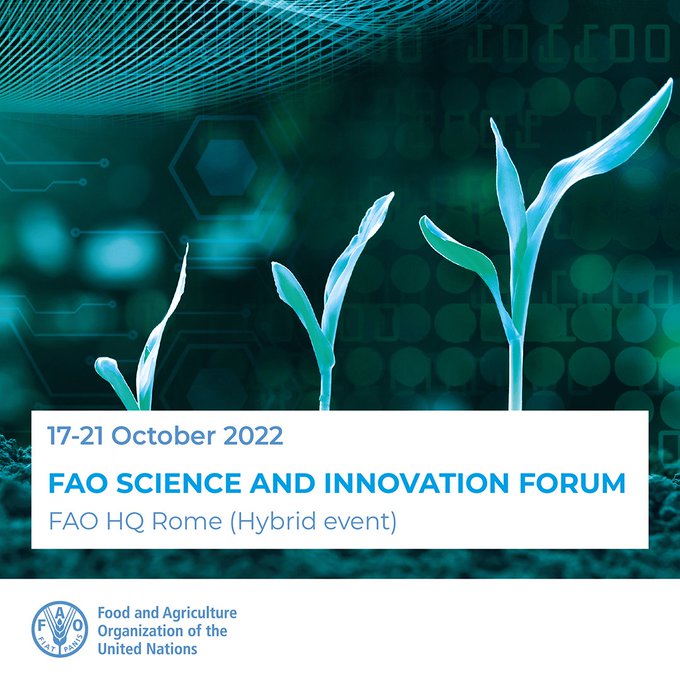


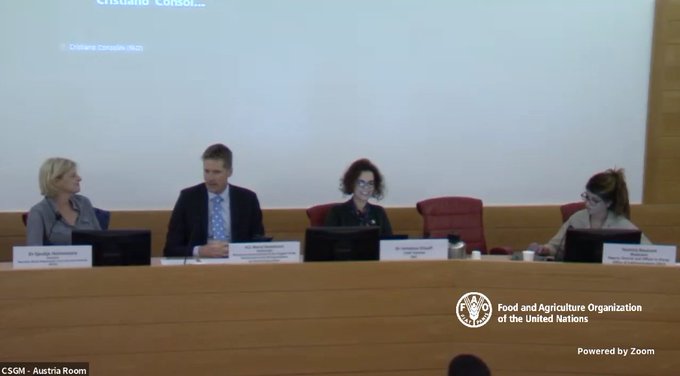
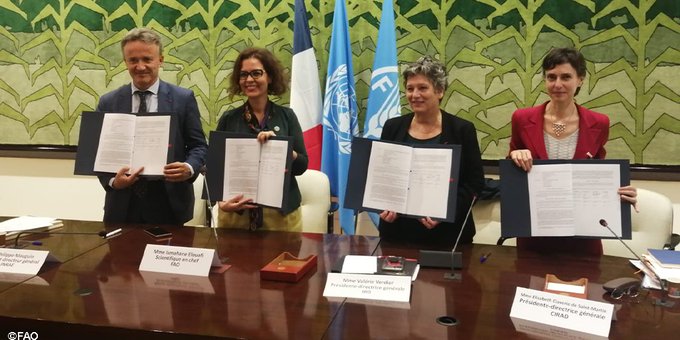
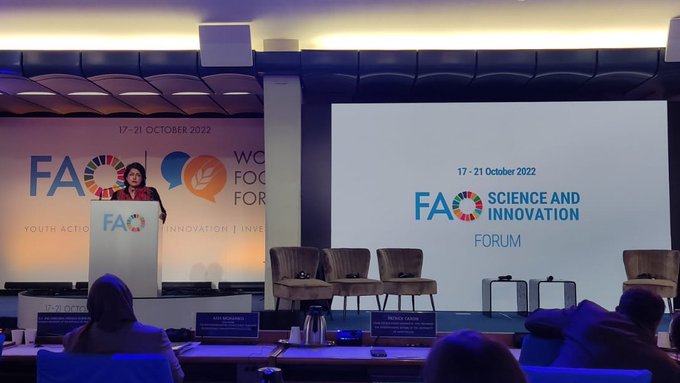



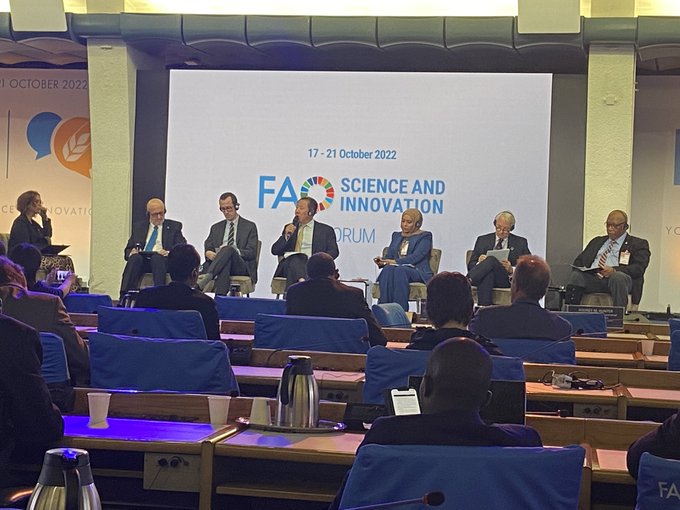

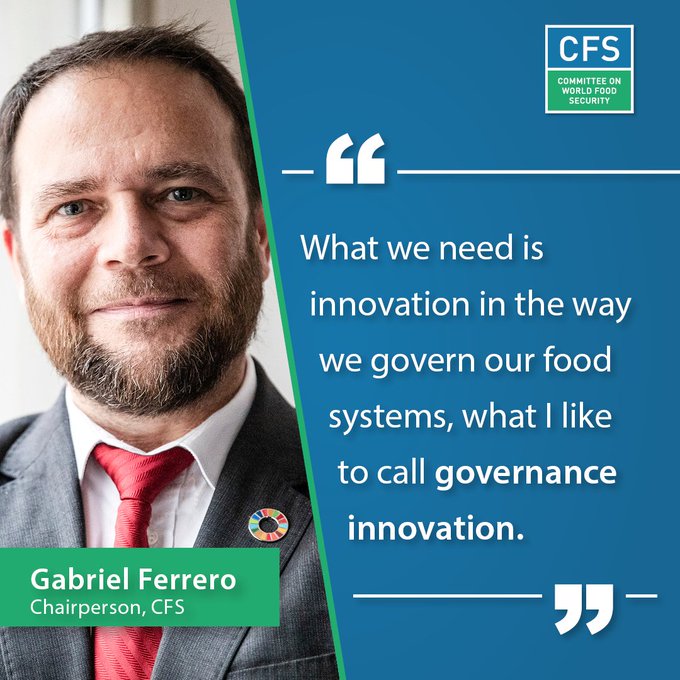

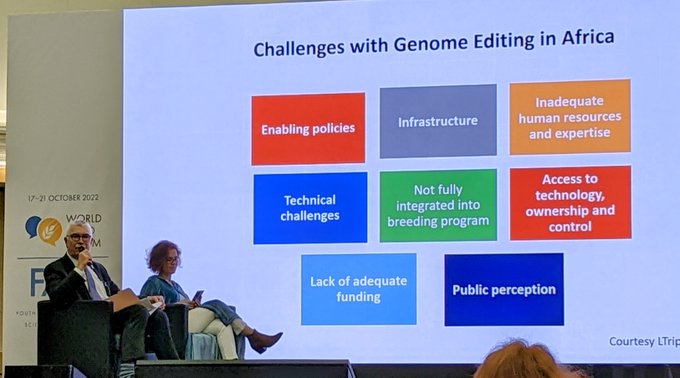
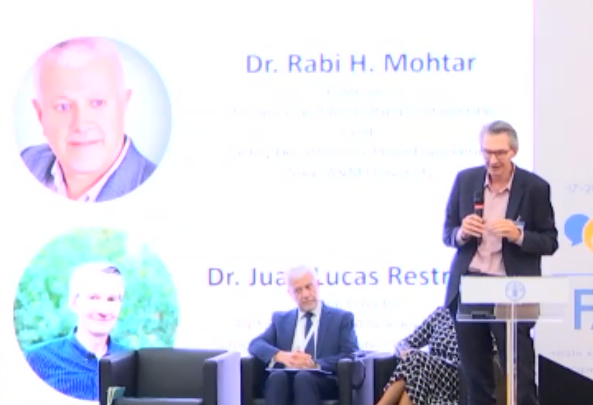
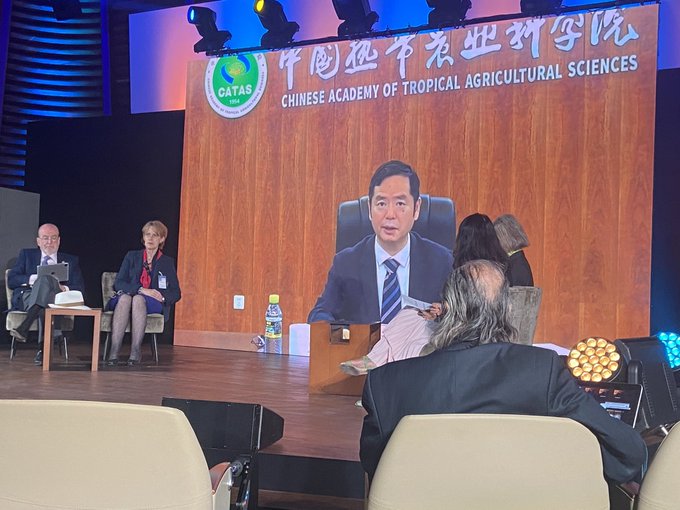
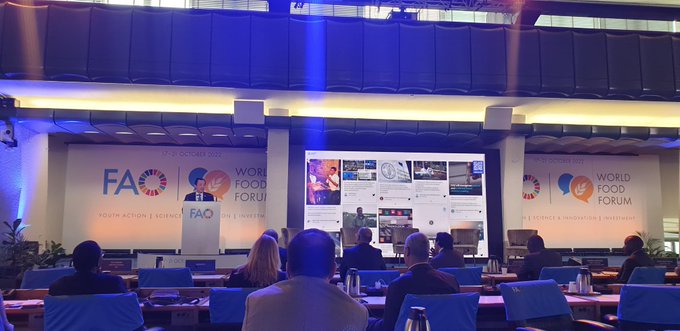
No comments:
Post a Comment